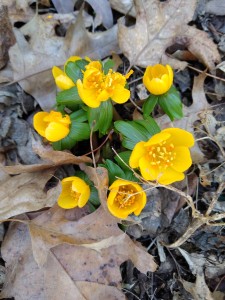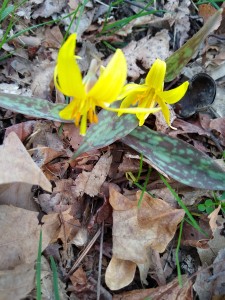 I know lots of people who make great use of either noise blocking headphones or devices that feed music, books or other forms of audio input directly into their brains via earbuds. There are many benefits to both—from blocking out all the extraneous noises that the modern world generates, to, in the case of audio content, soothing and/or enriching our fevered brains.
I know lots of people who make great use of either noise blocking headphones or devices that feed music, books or other forms of audio input directly into their brains via earbuds. There are many benefits to both—from blocking out all the extraneous noises that the modern world generates, to, in the case of audio content, soothing and/or enriching our fevered brains.
Some people wear their earbuds in the garden, and if it enriches the gardening experience, I won’t criticize. Being outside is always better for health and wellbeing than camping out indoors in front of a computer screen.
For my money, though, I would rather be device-free in the garden, and “device free” definitely includes my cell phone. I like to feel at one with my surroundings—even if the only thing nearby is the compost pile.
The natural world is full of sensory experiences—sights, sounds, smells, tactile sensations and vibrations. Eighteenth century composer Antonio Vivaldi understood that, and his understanding led to the “Primavera” or “Spring” movement of “The Four Seasons” concerto, which conveys all the spring sensations in a joyous musical outpouring. When my soul feels parched in the depths of winter, I sometimes turn to “Spring” for refreshment.
Right now I am waiting for the arrival of real spring, which means the smell of the mud. You can usually perceive that fresh, earthy odor as the ground warms up, but before it is ready for planting. It doesn’t last all that long, but generally is strongest around the time that the early crocuses appear. Several weeks after the smell of the mud becomes noticeable, I get down on my knees and grab a handful of soil. Good garden soil is ready for planting when it has a texture reminiscent of chocolate cake and feels warm enough to hold comfortably in your hand.
In the early spring, if you stop for a moment, you can hear the garden humming all around you. After all, a million things—plants, insects, animals and birds—are going into high gear, shooting up from the earth, emerging from hibernation or returning from southern winter vacations. Even the cardinals that stayed through the winter amp up their singing as the mating ritual commences. With luck I might spot a mourning cloak butterfly emerging from whatever protected space it inhabited during the cold months. If I were distracted by the stimuli coming in through earbuds, I would miss most of that.
You can’t really understand the stillness of winter until you experience the uproar of spring.
Every year as I plan for the growing season, I need to rediscover my little piece of land. Taking a tour of the property every few days gives me new perspective. I feel the high, low, dry and squishy areas through the soles of my garden clogs. I notice the buds on the shrubs and take in the wreckage left behind by winter storms. No matter what the extent of that wreckage, the garden tour feeds inspiration and imagination. Of course it also depletes my pocketbook, because it often moves me to order plants and supplies. On balance though, the inspiration outweighs the damage to my credit card balance.
Spring is high time for the garden sensory experience, but it continues through the rest of the growing season. In high summer, my garden smells of honey and a combination of the various plants’ essential oils as they are teased out by the sun’s warmth. All of those scents mingle harmoniously with the sweet fragrance of freshly mown grass. I wish those scents were not regularly overpowered by that of the gas powered equipment that cuts the grass, but I can’t really begrudge my neighbors the convenience of their lawn services.
Sometimes I hear parents complain that they can’t get their screen-addicted children out of the house. This is a societal and generational issue, but children model behavior after their parents—not always immediately, but eventually. If the adults in a household make a habit of tuning in to the natural world, children are more likely to do so.

It is a little embarrassing to talk to your plants, though I confess to doing so occasionally. It is less embarrassing to listen to them. I recommend it as we move headlong into spring.
